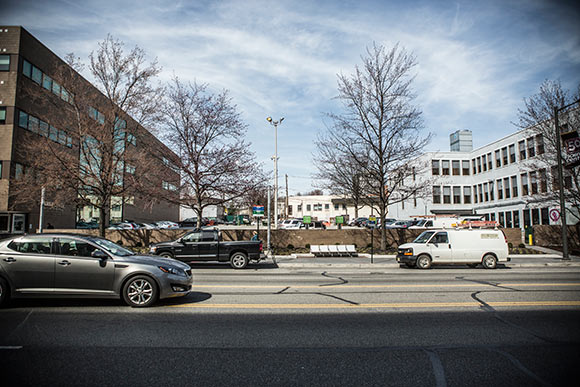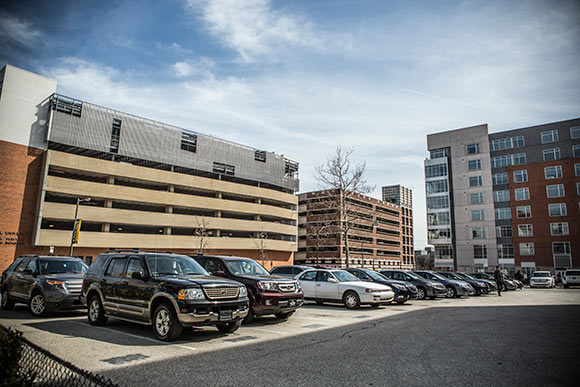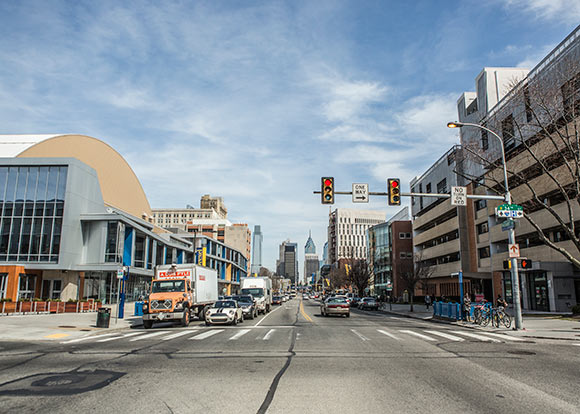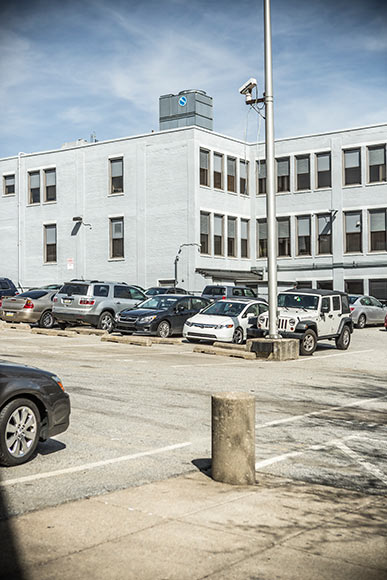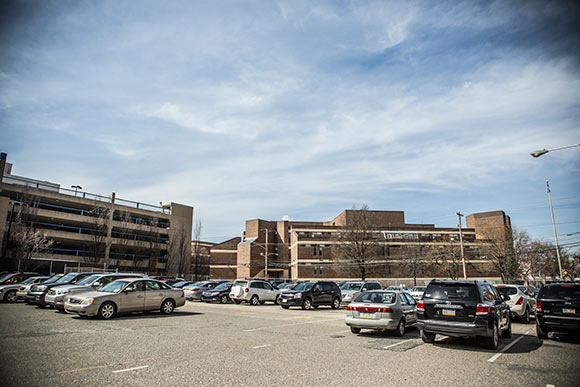Market Street is a major artery in the heart of Philadelphia. An axis of our famed street grid, Market runs from the Delaware River to beyond the city's western limit. In Old City, some of the Philly's most famous historic landmarks straddle the famous corridor, and in Center City the street turns into the region's largest business district — an urban canyon of corporate and government offices that is gradually attracting residential development.
But by the time Market Street reaches University City, the corridor's glamour fades. The wide avenue is pocked by surface parking lots and vacant lots, serves as an (often harsh) division between neighborhoods, and is dominated by vehicular traffic. That inhospitable landscape might explain why so many prominent West Philly institutions and neighborhoods have for decades turned their backs on Market Street, focusing development on areas further south.
That is changing. Ambitious mixed-use, pedestrian-friendly development plans from stakeholder groups, including University City District (UCD), the University City Science Center and Drexel University, are set to transform Market Street.
In 2011, a big shift began with a small move — UCD piggybacked on a larger PennDOT project, replacing 34 parallel parking spaces adjacent to 30th Street Station with a flexible open space now known as The Porch at 30th Street Station. With an ambitious slate of programming and its proximity to the nation's third busiest train station, The Porch was an overnight success, earning national attention for its success creating a dynamic public space on the cheap.
On the local level, The Porch served as the impetus for rethinking the stretch of Market Street that runs through University City.
Already a number of large-scale developments are under construction, including the Grove at Cira Centre South (Brandywine Realty Trust's 33-story 850-unit tower) and Chestnut Square, a mixed-use academic-oriented structure on Drexel's campus. Now, University City's major players are set to transform nearly 8,000,000 square feet of underutilized surface parking lots within a quarter mile of The Porch. Not even two full years old, The Porch has become the corridor's shining beacon, a central reference point for those recreating and Market Street's identity.
“We're trying to say, 'This is an important public space in Philly,'” says Prema Gupta, Director of Planning and Economic Development at UCD. “Over the next year, we hope The Porch will start to be seen as a park on par with other great parks in the region. It could be Philly's sixth square. It's that important.”
Gupta says to expect more capital-intensive permanent improvements in the next year, including trees, shade structures and fixed seating. She hopes The Porch's pedestrian tone will rub off on other projects nearby.
“We want to set the standard for Market Street as a future pedestrian environment,” says Gupta. “There's a real need for human-scaled spaces in the area.”
While The Porch anchors the east end of Market Street in University City, the Science Center is working on the corridor's west end. The urban research park is busy trying to lure residents and retail to the stretch of the thoroughfare between 34th and 39th Streets.
A recent market analysis commissioned by UCD showed desire for an additional 110,000 square feet of retail space along Market Street.
“The study shows a demand for a mixed-use, pedestrian-oriented environment,” explains Stephen Tang, president and CEO of the Science Center. “Right now, from 34th to 39th Street is a concrete canyon. Adding retail can bring the vibrancy we want.”
Hoping to capitalize on that demand, the Science Center is building a 400,000-square-foot, 27-story mixed-use building at 3601 Market Street. The completed project will feature 364 apartments and 17,000 square feet of ground-floor retail.
Tang explains that the eventual goal is to make their campus and its environs just as lively by night as it is by day. “It might sound silly to say, but you really do need people to make a community,” he says. “That's the component were adding at 36th and Market.”
When the project is complete (in 2015), the Science Center will turn its attention to 38th and Market, where Tang anticipates building another 700,000-square-feet-worth of mixed-use development.
Together with the under-construction 273,000 square-foot, mixed-use Penn Presbyterian Medical Center-anchored high rise at 3737 Market, these buildings will become an integral part of the transit-oriented neighborhood city planners envision sprouting up around 40th Street, University City's western edge.
Meanwhile, the other big land owner along Market Street, Drexel University, is focused on increasing the number of students (and jobs) on the corridor. As part of their “Innovation Neighborhood” plan, Drexel intends to develop 12 acres of surface parking lots in an area loosely bound by 30th Street Station to the east, JFK Boulevard to the north, 32nd Street to the west and Chestnut Street to the south. When all is said and done, the area will feature all the basic necessities of a 24/7 neighborhood: mixed-uses, high densities and multi-purpose destinations.
On Market Street, Drexel wants to provide an environment for fostering education, research, entrepreneurship and technology. The new 11,000-square-foot ExCITe Center at 3401 Market Street is the first physical manifestation of their mission. Seen as a nexus between technology and art, ExCITe serves as a work area and showcase for multi-disciplinary projects while also providing seed funds for startups.
ExCITe joins LeBow College of Business' under-construction 12-story home; the new Perelman Plaza at 32nd and Market; and the new URBN Center (the Antoinette Westphal College of Media Arts & Design's new headquarters) at 3501 Market.
Keith Orris, senior vice president of Corporate Relations and Economic Development at Drexel — and the man in charge of implementing the Innovation Neighborhood — says Market Street is a “key corridor” in their strategic plan. The neighborhood's first new-construction, mixed-use project will be located there.
Just north of 30th Street Station and across from the upcoming LeBow College of Business, Orris sees the future project (which is in the early stages of development) as one of the last remaining gaps between The Porch to the east and the Science Center Campus to the west.
“It's a really interesting point in time,” adds Stephen Tang. “Everyone's looking to create synergy with other vital areas and become a more collective neighborhood.”
The University City Science Center has partnered with sister publication Flying Kite to showcase innovation in Greater Philadelphia through the “Inventing the Future” series.
GREG MECKSTROTH is sister publication Flying Kite's Development News Editor.
Photographs by MICHAEL PERSICO
